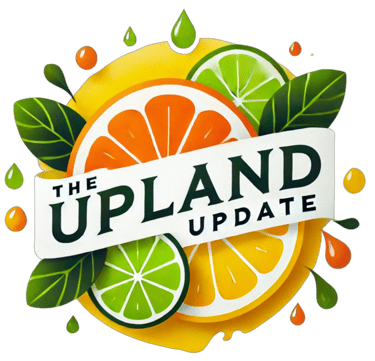Upland City Council Meeting Summary Report
September 8, 2025


Upland City Council Meeting Summary Report
Monday, September 8th
Opening
The meeting commenced with an invocation, followed by the Pledge of Allegiance. The invocation included prayers for victims of September 11th and other acts of terror, those affected by gun violence, and recognition of the work being done to preserve local history and heritage.
Presentations
The evening featured a presentation from the Cooper Museum. The museum’s mission is to promote understanding and appreciation of the history and culture of the surrounding communities from 1880 to the present, including local indigenous Gabrielino Tongva tribes. Located in downtown Upland at 2nd and A Street across from the MetroLink, the museum is open Fridays and Saturdays from noon to 5:00 PM with donation-based admission.
Current exhibits include Our Collective Canvas, showcasing 18 local artists and running until November 8th, with an opening reception scheduled for October 4th. The upcoming exhibit, Community Champions, will highlight local nonprofits from November 21st through January 24th. The museum also offers venue rentals and will launch 2026 memberships in October. Volunteers remain essential to its operation. A certificate of recognition was presented to acknowledge the museum’s revitalization efforts.
Consent Calendar
The consent calendar was approved with the exception of Item E, which was pulled for discussion. Item E involved an anonymous donation of $107,534 to the Upland Police Foundation. The donation will fund the replacement of a police K9, including acquisition, vehicle outfitting, and training. The foundation also supports officer training, equipment, and youth scholarships. Gratitude was expressed for the generosity of the donation, and the motion passed unanimously.
Public Hearing: Housing Element Rezoning Program
State Mandate (RHNA):
The city is required to update its housing element every eight years. For the sixth cycle, the city must plan for 5,686 dwelling units, compared to 1,500 units in the previous cycle. Allocations come from the state and are distributed via regional agencies.
Compliance Risks:
Failure to finalize certification and implement rezonings could result in the loss of local control, vulnerability to “builder’s remedy” projects, and loss of state funding. The city is currently “conditionally compliant.”
City Strategies:
Two strategies were highlighted:
Transit Overlay Zone (TOZ): Permitting densities up to 40 dwelling units per acre within a half-mile of the Montclair Transit Station, accounting for 1,719 units.
Accessory Dwelling Unit (ADU) Bonus Program: Allowing additional detached ADUs on large parcels, contributing over 200 units, particularly for moderate-income housing.
Upzoning and Site Selection:
Rezoning sites were chosen based on developer interest, underutilization, transit access, school proximity, and state requirements for equitable distribution. Changes include creating new RM40 zones, increasing density allowances in existing zones, and rezoning certain public and industrial lands for residential use.
Environmental Review (CEQA):
Rezonings do not equate to construction approval. Future projects will still undergo entitlement review and CEQA standards. A program EIR from 2015, along with an addendum and state exemptions, covers the current rezonings.
Eminent Domain & Non-Conforming Uses:
It was clarified that eminent domain cannot be used to take private property for private development. Non-conforming uses will have a 10-year amortization period, with potential extensions.
Public Comments:
A total of 14 speakers addressed the council, with five letters of opposition and one letter of support submitted in advance. Concerns included:
Density & Congestion: Fears that high-density rezoning would increase strain on infrastructure, parking, and neighborhood character.
Privacy & Property Values: Opposition to multi-story developments near single-family homes due to concerns about privacy, noise, and decreased home values.
Specific Properties:
Arrow Highway/San Antonio: Calls for RM20 zoning instead of RM30 or RM40.
21st and Campus (Greystone property): Residents supported RS10 zoning due to fire risk, infrastructure limits, and neighborhood character.
1500 West 9th Street: Support for rezoning from industrial to Business Residential Mixed Use.
Communication & Trust: Frustration expressed over lack of awareness about the rezoning process.
Parks & Open Space: Calls for additional park planning alongside housing growth.
Council Discussion & Decisions:
Officials acknowledged the difficulty of balancing state mandates with local concerns and stressed the risks of non-compliance. Higher density in lower parts of the city reflects state transit-oriented development requirements, while some rezoning in North Upland fulfills fair housing distribution.
Approved modifications included:
21st and Campus: Changed to RS10 zoning.
1500 West 9th Street: Changed to Business Residential Mixed Use.
Arrow Highway/San Antonio: Changed to RM20 zoning.
Although this slightly reduced the compliance buffer, the council deemed it an acceptable risk. The vote was unanimous to adopt the resolution with the amendments.
Council Committee Reports
IEUA: Advocacy for direct pass-through of fees.
Chino Basin Water Master: Awaiting safe yield numbers affecting water rates.
SBCTA: Rejected $37 million for Gold Line extension; funds recommended for increasing train frequency instead.
Omnitrans: Upland continues to benefit from a direct call-in bus service, with discussions on covered stops along Foothill.
Homeless Outreach: A 200-bed shelter is being built in Fontana in partnership with the county, with Upland participating. Local outreach and animal shelter efforts were commended.
Council Communications
Officials thanked staff for their work on the complex Housing Element and praised police and development services. Despite state constraints, the outcome was described as a positive step forward.


